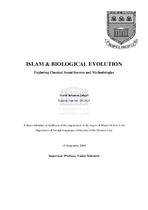| dc.description.abstract | This research investigates, within the framework of classical Sunni Islamic scholarship,what we might expect an Islamic opinion about evolution to be,bringing together an accurate and detailed understanding of evolutionary biology as the field stands today with a systematic consideration of the traditional Islamic sciences.The scope of the study encompasses the scholarly traditions recognized, at least by their respective adherents, to be part of Muslim orthodoxy – referred to in Islamic discourse as Ahl al-Sunnah wa al-Jamāʿah or more colloquially as “Sunni”. It covers the works of the scholars of the Ashʿarī, Māturīdī, and Salafī theological schools as well as the sources which they all draw upon – the Qur’ān, the Sunnah, and the opinions of the Salaf.The reason for this choice is that these traditions represent for most Muslims the “mainstream” of Islamic thinking, and therefore have a greater relevance for determining what a general Islamic perspective on evolution could be.The study first identifies and defines the methodological approaches of classical Sunni scholarship that have relevance to the question of an Islamic position on biological evolution. It also identifies and defines the issues within the field of Evolutionary Biology that need to be brought under scrutiny. The methods of classical Islamic Theology are then applied to the claims of Evolutionary Biology, drawing on traditional Islamic sources. The result of the study is an extrapolation of what an orthodox Islamic position towards biological evolution could be. Is Islam neutral towards the idea of biological evolution? Does it support it or categorically reject it? Can it accept certain aspects of Evolutionary Biology while rejecting others?Finally, the extrapolated “classical” Islamic position on evolution is compared with the writings of some contemporary Muslim scholars whose views run contrary to that extrapolation. Possible reasons for the discrepancy are explored.Such an interdisciplinary work should provide a valuable frame of reference for a more accurate analysis of the creation-evolution debate unfolding in the Muslim world today. | en_US |

